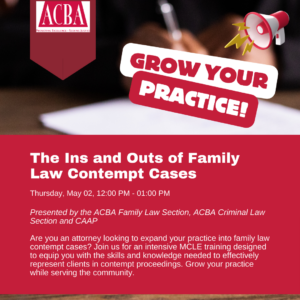Navigating the intricacies of family law contempt cases requires a nuanced understanding of legal principles and courtroom procedures. As attorneys, our commitment to justice extends beyond traditional practice areas, encompassing the responsibility to advocate for clients facing contempt allegations. The upcoming MCLE training, “The Ins and Outs of Family Law Contempt Cases,” on 5/2 at Noon, presented by the Alameda County Bar Association (ACBA) and the Court Appointed Attorneys Program (CAAP), offers a unique opportunity for legal professionals to enhance their skills and make a meaningful impact in the community. We are grateful to Alameda Superior Court Judge Jason Clay and criminal defense attorney (and ACBA Board Vice President) Jo-Anna Nieves, The Nieves Law Firm, for agreeing to speak on this topic.
 Understanding the Importance:
Understanding the Importance:
Family law contempt cases often involve complex legal issues and emotionally charged situations, requiring attorneys to possess specialized knowledge and expertise. These cases can encompass a wide range of behaviors, from violations of court orders to failure to comply with child support obligations, and may have significant implications for all parties involved. By taking on family law contempt cases through the ACBA’s court-appointed program, attorneys can provide vital legal representation to individuals who may otherwise lack access to justice.
Key Training Highlights:
- Legal Framework:
- The training provides a comprehensive overview of the legal framework governing contempt proceedings in the context of family law. Attorneys will gain insights into the behaviors that may lead to contempt charges and the remedies available to the court, empowering them to navigate these complex cases confidently.
- Procedural Essentials:
- Attorneys will learn the procedural rules governing contempt actions, from initiating proceedings to presenting evidence and arguing in court. Practical guidance on drafting pleadings, motions, and orders related to contempt ensures that attorneys can effectively represent their clients throughout the legal process.
- Evidence and Discovery Strategies:
- Mastering the art of gathering and presenting evidence is essential in family law contempt cases. The training offers strategies for addressing evidentiary challenges, seeking protective orders, and compelling discovery responses, enabling attorneys to build strong cases on behalf of their clients.
- Client Management and Advocacy:
- Effective representation in contempt proceedings requires more than just legal expertise—it also entails skilled client management and advocacy. Attorneys will learn strategies for managing client expectations, negotiating settlements, and advocating for their client’s interests in court, fostering positive outcomes for those facing contempt allegations.
Benefits of Participation:
Participating in the training on family law contempt cases equips attorneys with the necessary skills and knowledge to provide effective representation and offers additional benefits for the legal profession and the community. By joining the ACBA’s Court Appointed Attorneys Program (CAAP), attorneys can take these cases and gain valuable courtroom experience while serving the community and upholding the principles of justice.
As legal professionals, we must ensure access to justice for all individuals, regardless of their circumstances. By training on family law contempt cases and participating in the ACBA’s court-appointed program, you can fulfill this responsibility while expanding your practice and making a meaningful impact in the lives of those in need. Join us in our commitment to upholding the rule of law and advocating for fairness and equity in the legal system.
